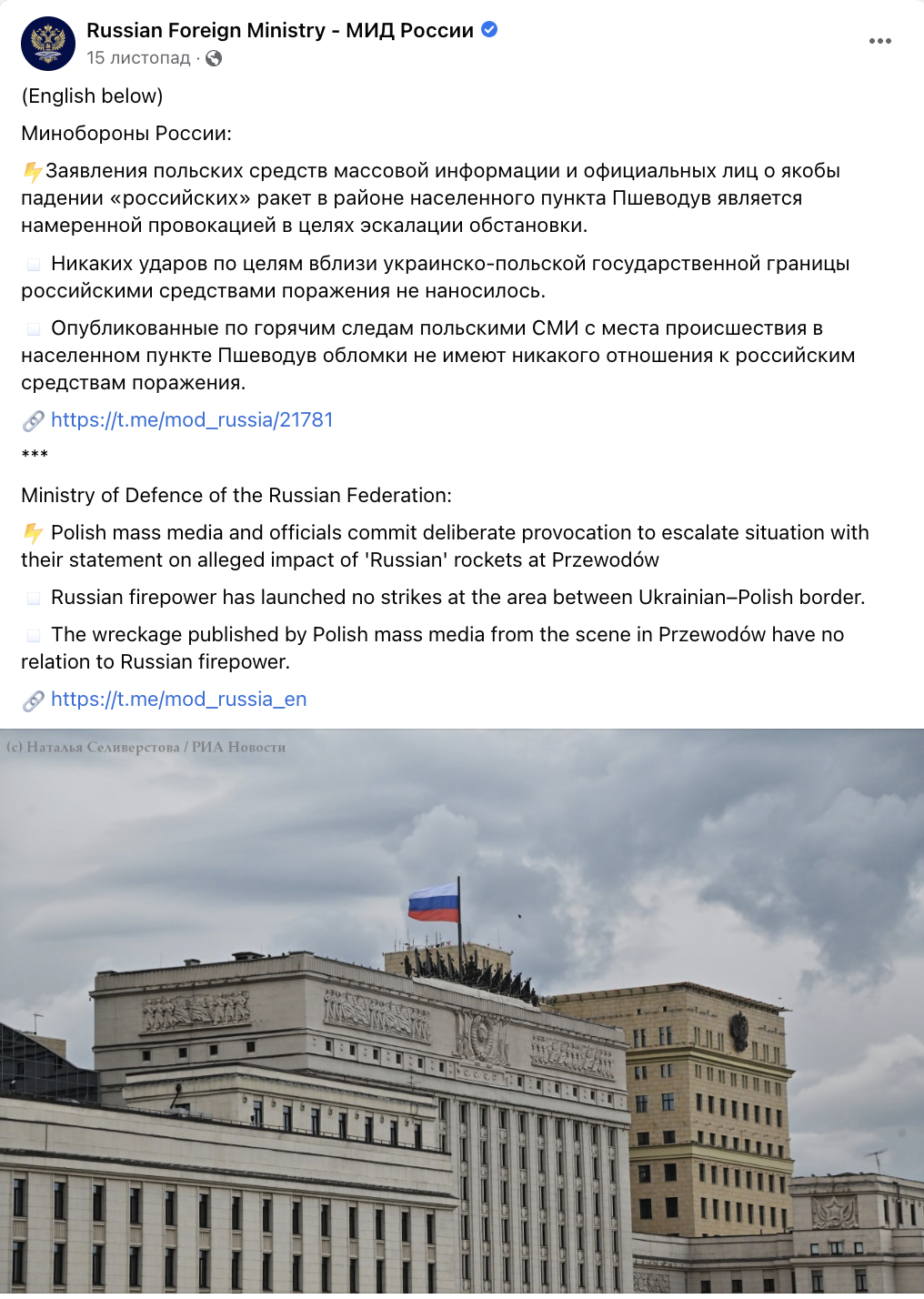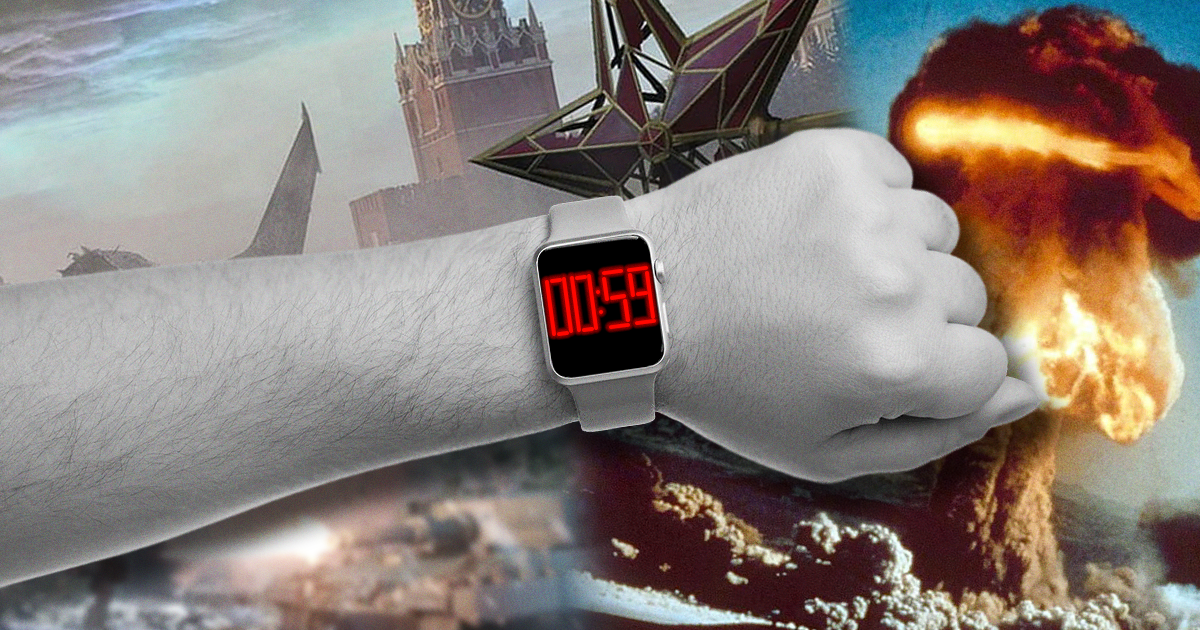Why Meta should pay attention to the pages of russian diplomatic institutions
November 15 turned out to be not too calm a day for almost the whole world. Ukraine suffered yet another massive bombing of the energy infrastructure. As a result, about 10 million Ukrainian people were left without power supply, water, heat, or stable communications. As soon as in the evening on the same day, it became known that the rockets had made a mess in Poland. The media reported that the town of Przewodów, near the Ukrainian-Polish border, was hit by a rocket that claimed the lives of two local residents.
After that, a real explosion broke out in the information space: some promised that Ukrainians would see F-16 planes in their skies, others worried that the Third World War would begin any moment from then. There were also different versions of the origin of the missile: some said that the explosion was caused by a deliberate (or accidental) attack by a russian missile; others said that the cause of the tragedy was a missile of the Ukrainian ASW that failed to hit the target.
At the same time, since the Polish authorities waited for the completion of investigation and did not comment on the incident, a certain information void developed around the explosion-related topic. Since the official information or details were lacking, this empty space quickly filled with rumors and "insider info." In addition to conspiracy theories fans, the russian disinformation machine also took advantage of the information chaos. The official messages of the russian Foreign Ministry and other representatives of the russian authorities instantly spread on the Internet. Later, outright russian propaganda followed. In this paper, Ukrainian non-governmental organization Civil Network OPORA, analyzing the spread of disinformation in social networks, explored into what was written on Facebook about Przewodów and how russia promoted its propaganda narratives about the rocket attack on the town.
To Each Their Own: a Network of russian Messages
In order to track false information and channels of its dissemination, OPORA used Crowdtangle, a Meta tool for Facebook and Instagram analysis. We used it to upload and analyze posts on Facebook pages and groups that contained the keywords "Пшеводув" and "Przewodów" for the period from November, 15 to 24. There were 6,513 such posts, among them 1,021 (15.7%) post were identified as propaganda. This is the largest share of misinformation that we found in our research so far. In previous reports by OPORA, the share of russian propaganda among other posts rarely exceeded 10%.
Disinformation messages that we found in the posts can be divided into 6 categories: some posts promoted comments of russian officials and authorities; others included criticism of the Ukrainian and Polish authorities, Western countries, individual politicians of different other countries; they also suggested the deterioration of relations between Ukraine and its Western allies. The following slides present a summary of key messages:
The largest share of misinformation (338 posts or 33% of detected propaganda) send a message with the openly pro-russian content. This category included reposts of the russian Ministry of Foreign Affairs, statements of russia's Ministry of Defense, dmitrii peskov, or vasily nebenzya. The content of these statements is easy to imagine: russia is not guilty, the missile strike is a provocation of the "Kyiv regime"; Polish and Western politicians and the media "spread russophobia" (you can find a full list of excuses and accusations in this post of the russian Ministry of Foreign Affairs). Most of these statements appeared on the evening of November, 15, and gave impetus to the development of other branches of disinformation.
Almost identical share of posts (32% or 325 posts) contained messages with anti-Ukrainian rhetoric. They combined a whole array of statements discrediting Ukraine, Ukrainian people, and Ukrainian authorities, as well as calls for resuming the peace negotiations with russia. The most popular message with anti-Ukrainian rhetoric is that Ukrainians often lie, so you shouldn't trust them or Volodymyr Zelensky (this has been mentioned in 163 posts). There have also been much more radical narratives (“Ukraine is a neo-Banderovite state, so they aim at destroying Poles”).
Quite a large share of posts (17% or 175 posts) included anti-Western rhetoric. They were mostly saying that the missile attack on Przewodów was not an accident but a planned provocative act coming from the West countries and Ukraine in order to eventually unleash the Third World War (it was written in 132 posts). Many posts are trying to discredit NATO: they claimed that the alliance was allegedly incapable to respond to the attack.
Narratives about the deterioration of relations between Ukraine and the world were much less popular – 72 posts (7%), about Poland's insufficient sovereignty (because they waited for the consent of allies to publish the version of the investigation about the Ukrainian ASW missile) – 61 posts (6%), and on unacceptable reactions of politicians of different countries to the missile strike – 50 posts (5%).
Who Disseminates russian Disinformation?
You should not think that the narratives described above were distributed in some russian-speaking countries only or that they were limited solely to the territory of Poland. In fact, only about 10% of the disinformation we found was published in the russian language. On the other hand, almost 90% of fake reports came in English, Polish, Spanish, Italian, and other languages.
With Crowdtangle, we also explored the countries that were creating the disinformation on the missile strike the most. Poland was most active in that regard (101 posts), as well as russia (42 posts). Some less active countries were the Czech Republic (33 posts), Slovakia (16 posts), Italy (15 posts), and others.
It is also interesting to see where the false information was shared. Most often (527 posts) it was shared from pages that did not indicate their focus areas. They are mostly small pages or groups. They also include some overtly pro-russian pages (България и Русия- братски съюз!, Vladimir Poutine, etc .), as well as the less popular political pages from certain countries (PEDRO CASTILLO PRESIDENTE DEL PERU, Румен Радев ВТОРИ МАНДАТ! ). We also identified much propaganda on the pages of the media (216 posts) – both russian (RT DE, Коммерсантъ Политика) and international pages (Afrique Magazine News, El Informador Venezuela, etc.).
It came as a true surprise for us to see how active the russian ministries, embassies, consulates and other state institutions turned out. They published 90 posts with disinformation. They mostly reposted the publications of the russian Ministry of Foreign Affairs justifying the russia's faultlessness. This is particularly surprising because since March, 2022, Meta's activities in russia have been prohibited, and recently Roskomnadzor has included Meta in the list of extremist resources. However, as we can see, this is not an obstacle for the russian Embassy in the DPRK to refute the statements of the Polish media on their Facebook page.

Pages of political parties were less active in producing and sharing disinformation – 60 posts, followed by individuals (mostly politicians or well-known political observers) - 18 posts, and by NGOs – 5 posts.
Make russia Lose the Information War
As we can see, the lack of official posts and information chaos were not confusing for the machinery of russian propaganda. On the contrary, they quickly got their bearings and almost immediately launched a powerful international campaign to justify themselves and discredit Ukraine and its allies. In our opinion, this means that russian propaganda seems to be learning from their own mistakes and tries to adapt to new reality. At the beginning of the full-scale invasion, russia focused on influencing their own population and on information operations within Ukraine. Now, however, they are increasingly more often undermining the public sentiments in the social networks of international audiences. This shows, among other things, how large (almost 16%) the share of misinformation is among the posts about the rocket attack in Przewodów.
However, the adaptability of russian propaganda means one thing only: Ukraine and Western countries should also adjust their own information strategies to the new environment. Firstly, the information void played the most into russia's hands. The void developed because of the lack of official information, which allowed russians to flood the information space with their own versions of the event. At the moment, this means one thing only: official entities should provide information as quickly and detailed as possible, creating newsbreaks themselves.
Secondly, since most russian television resources are banned in Western countries today, the Internet and social networks are still the main “battlefield” to win over Western audiences . Meta has done quite a lot to limit the capacity of russian propaganda in influencing users in Western countries. Likewise, due to the decisions of individual governments and EU leaders, some channels of russian propaganda in Telegram and Facebook or Instagram pages are not available to users from those countries. However, as our research shows, russian propaganda is not limited to Russia Today, Sputnik, or Tass pages, and they are using other channels to broadcast their "own point of view." Instead, they are using a whole network of pages of their supporters in different countries. For example, the page България и Русия- братски съюз! keeps appearing in our research, at least for the third time, and it is still available, even from the EU member states. Moreover, the russian federation now uses its own diplomatic pages for propaganda. At the moment, it is not very clear to us why Meta does not apply any sanctions against outright propaganda pages, while at the same time, they keep displaying the warning "potentially unacceptable content" every time Ukrainian users reveal the consequences of this propaganda on social networks.
Thirdly, we are aware that social networks will not have the desire and ability any time soon to detect and remove all propaganda and harmful content. That is why the only thing we can do to counteract russian propaganda is to learn to detect it and debunk it.
Taken together, these three factors (the development of media literacy, the government’s ability to successfully communicate, and the creation of transparent social media policies to counteract harmful content) will be useful for us not only now but also after the victory in the war with the russian federation.
